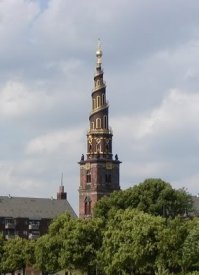On PBS public educational television (America's version of BBC), I watched Dr. Spencer Wells, Journey of Man, where he goes all around the world, taking blood samples. The segment which shows him above the Arctic circle, in Siberia, with the Chukchi reindeer herders, whose life resembles, in some ways, life in prehistoric, neolithic times.... yet when the Chukshi spoke, I understood their Russian, and it did not sound remarkably different from other Russians I have heard. I was quite surprised, expecting that they would have some non-slavic native language. And, I wondered how they might acquire and maintain such fluency, since they do not use radios or television. Though, perhaps they do have their own language and it was just not spoken during the documentary.
I was in the streets of a city in USA, and the young man next to me looked Chinese, but was speaking Russian. I guessed where he was from, in Russian, and that he was Islamic. He was so amazed that I would know such things.
What I was thinking about today, after reading parts of this thread, was an old monk in Jordanville named Prokopy (Prokopius). I guess he was in his early 60's when I knew him, which was around 1974. He was the cook for the monastery. One day, he told me his story. He was such a simple innocent person. He came to the monastery, and lived for several years simply as a layman, a worker, working in the cowbarns in in the fields. He said that one day one of the Monks came to him and said,.... "Well, you should not cut your hair or shave, but should be as we are." So, for several more years, he worked as a layman, in laymans clothing, but did not shave or cut his hair. He said after several more years, another monk came up to him and said, "You have a long beard, as we do. You should not dress as a lay-person. You should become a novice and wear a black kassock." So, Prokopy did as the monk suggested. Another ten years went by, and one day, a monk came up to him and said, "You have been a novice for some years now, it is time for you to be tonsured as a rasophor." So, Prokopy was tonsured a monk. He did not move any higher, because he was such a simple person, possibly unlettered, and he would not have been suited for the complexities of the deaconate or priesthood. But, he was so humble, than he never requested anything. He was without pride or ambition. Many of the young Russians, and also the converts, were always eagerly pushing to become a novice, to be tonsured rasophor, to be tonsured small schema, to be ordained as deacons, to become priests. They were good people, but they had natural ambition and self-will. But Prokopy was blessed with such a simplicity. One might easily imagine him in one of Doestoevsky's novels. I am grateful that in my life I was able to know and work around such a unique person.
Every day, he would be in the kitchen, cooking. I never saw him angry. Quite frequently, during the day, as he walked by, he would say, in Russian, "Nu vot tak", which means "Well now there" (or something like that, perhaps others can render a better translation).
Anyway, that is my little story about old Father Prokopy.
We all ate our meals together in a dining hall which is called, in Russian monasterys, the "Trapeza", which is a Greek word for table.
The walls were covered with iconographic paintings. I always remember on one wall was written, above the paintings, in old church Slavonic, "Molchaniya ta-eenst-vo buduschee mir" which was something written by Isaac the Syrian, in Syriac, in the 6th century. It means "Silence is the mystery(sacrement) of the age to come", I dont remember the second part as well in Slavonic, but the statement concluded, "words are the weapons of this world."
Of course, monks were always encouraged to be silent during meals, and listen to the readings.
And, 365 days of the year, at every meal, there was always a HUGE pot of kasha available, which is boiled buckwheat groats (a kind of grain). Supposedly it has an enormous protein value. Monks never eat meat or fowl, and only have fish on certain days of the year. Also, potatoes every day. All the boiled potatoes you could ever want.
I learned an old Russian saying, "Schee da kasha, peescha nasha" which rhymes, and means "Cabbage soup and kasha is our food".





